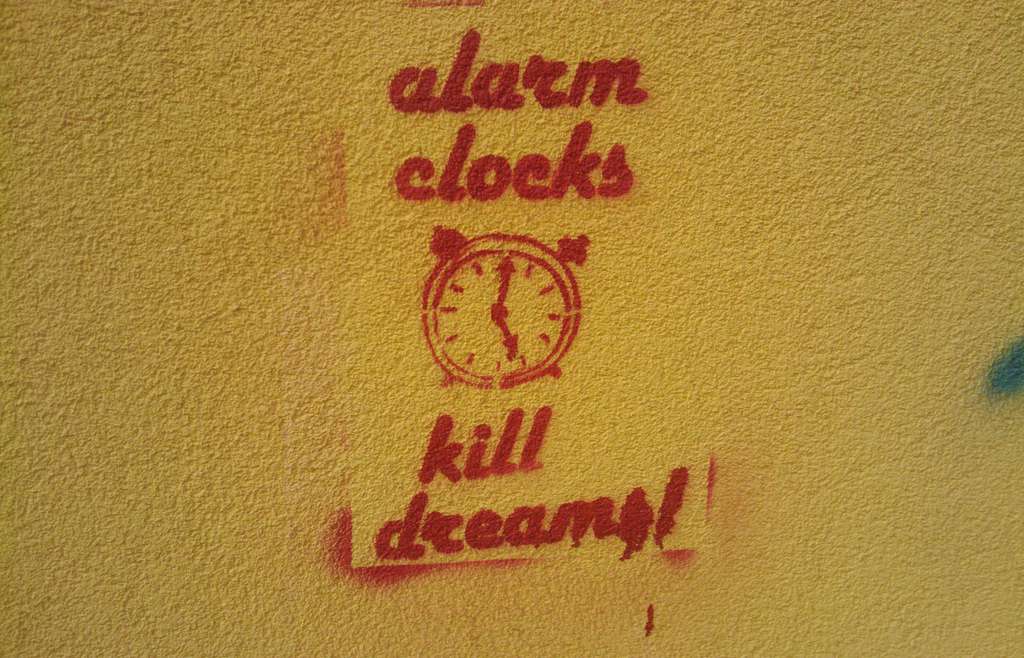Were you slow to wake up this morning, maybe hitting the snooze once more than you really should, maybe having another cup of coffee to try to get the motor running?
You probably feel a little sheepish about being groggy in the morning, right? Our culture loves an early riser.
“The early bird catches the worm.”
“Early to bed, and early to rise, makes a man healthy, wealthy and wise.”
It even goes back to Aristotle:
“It is well to be up before daybreak, for such habits contribute to health, wealth, and wisdom.”

Photo by Murdelta used under Creative Commons license.
I have tried various ways to convert myself to a morning person, from gradually bumping my wake up time back and to getting up the same time on weekends to going to the gym before work. But when we’re on vacation sans alarm clock, I quickly end up falling asleep at 1 a.m. and waking around 9 a.m., no matter what time zone we’re in.
John and I recently tried yet again to get ourselves to bed earlier so we could greet the morning with more enthusiasm. We failed in part because we like to have long, slow dinners that take a while to prepare and clean up, in part because we both feel a burst of creativity and motivation after dark, and in part because fun stuff happens at night. The gym at 5:30 a.m. or our favorite bar at 10 p.m.?
Maybe noble people are up with the sun, but I could make a lengthy list of fun activities, from parties to shows to socializing, that are timed for night owls.
So I found a New Yorker article headlined, “No, Mornings Don’t Make You Moral,” encouraging. It explained that our chronotypes — whether we are morning people or night people — are pretty stable, so it’s not surprising that trying to morph into loving mornings hasn’t worked. And it reassured me that I and the 40 percent of people who also prefer nights aren’t flawed.
“Our results should really dissipate those stereotypes of morning people being more saintly,” (Sunita Sah, a behavioral scientist at Georgetown University and a professed night owl) says. “The important thing is the match.” Early birds aren’t ethically superior. And, to the extent that other research suggests that they are, it may just be that they are luckier: modern society, for the most part, is built around their preferences. We are expected to function well early in the morning. We can’t just wake up when our bodies tell us to and work when we feel at our peak.
For Sah, this research is the first part of a broader examination. She is currently studying whether people who have clear ethical responsibilities in their careers — financial advisers, for instance, or doctors — make decisions with greater clarity when their work schedules and chronotypes align. “We need to think not just about ethical decision-making but the quality of the work and the cognitive processes,” she told me. “It’s much better to match people to schedules and structures based on their chronotype than to just force them into a schedule, knowing nothing.” She added, “I probably don’t want to set exams at 8 a.m. if I don’t want my students to cheat.”
Ultimately, the best policy may be to understand and embrace your chronotype. Sah says that it’s incredibly difficult, if not impossible, to overcome your predisposition and train yourself to function better at times that don’t match up with your inner clock. “There’s very little evidence that anything really works,” she says. So, late risers can take heart: they are neither immoral nor slothful. But, as long as the world isn’t operating on their terms, and unless they’re lucky enough to work in a place that endorses flexible scheduling, the early birds may still get the worms.
I fantasize about someday having a job that aligns with my natural circadian rhythm. If I’m ever a full-time consultant, I will likely schedule my first meeting for about 11 a.m. and work into the evening. I’ll either market myself to the west coast or to other night owls.
Until then, I try to get to sleep by around 11 p.m. and don’t always succeed, so I catch up by sleeping in on the weekends. Yes, yes, I know sleep experts say not to do it, but I haven’t had much luck changing that habit, either.

